
9 minute read
The Wesleyan, Summer 2019
Summer 2019 | Edition 30

THE PERSONAL EXCELLENCE EDITION
Why is boarding at Wesley so special?

This year, Wesley College received the prestigious Australian Education Award for Boarding School of the Year. The Australian Education Awards celebrate the outstanding achievements of the country’s top performing schools and our award recognises the most outstanding boarding school in Australia based on a range of criteria including: • Consistently high standards of teaching and learning • Academic and other achievements • Rigorous professional learning to improve teaching and curriculum delivery • Strong communication links with students, parents, teachers and the wider community • Effective management of facilities, finances and human resources • Demonstrated commitment to innovation and continuous improvement • Provision of a supportive home environment focussed on student wellbeing To celebrate the award, we spoke to different members of the community to see why they think boarding at Wesley is so special.
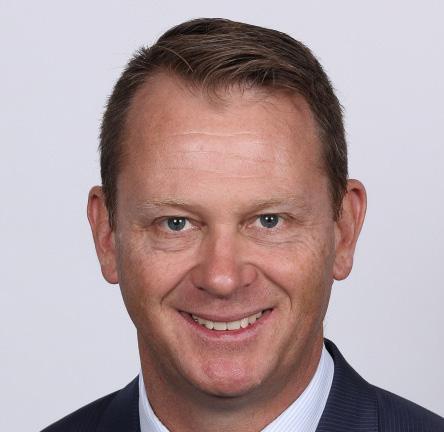
‘For me, living and working in the Boarding House means that you become part of a special community, within the larger Wesley community. This community is unique in that whilst it is only a small section of the College, it reaches out further and encompasses the whole of Western Australia and some international areas. Therefore, this community bands together strongly to support one another, embracing different cultures and backgrounds.’
Rodney Steer, Head of Boarding
‘There is an understanding in the Boarding House that it is a second home for all of the boarders. That means that it is a fun environment and you do feel as if you’re surrounded by students and staff who you can trust.’

Declan Nicholls (12C), Boarding Captain
‘I know that sometimes as boarders we can take the Boarding House for granted, but if we take a step back and compare it to other schools, Wesley Boarding is amazing. The facilities, the fairness, the food, the learning environment, the community… it’s all great.’
Darcy Kirby (9C)


‘I like the way there is so much support in the Boarding House and you have lots of people to talk to. There are the Year Coordinators, Residents on Duty, Prefects and your mates. Having all these people to turn to really helps with dealing with things like homesickness.’
Cyril Jones (701)
‘I love being part of the Boarding community. Everyone is so inclusive and it really is one big family. I love how the students come in as young boys and leave as fine young men. It really is a privilege to watch and I acknowledge the sacrifices the parents make to ensure their sons get the best education possible.’
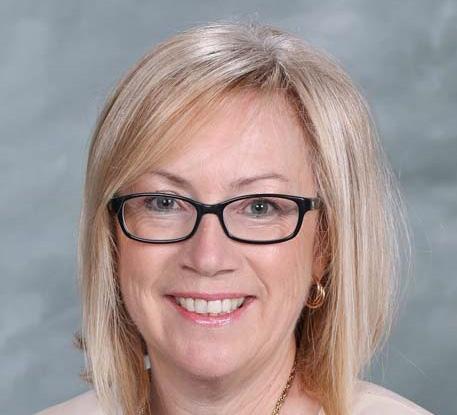
Sharyn Lynch, Boarding House Administration Assistant
‘The positioning of the Boarding House makes it easy for us to head off campus. We are so close to the foreshore and the shops on Angelo Street. We get a lot more freedom as Wesley boarders to go out to these sorts of places.’
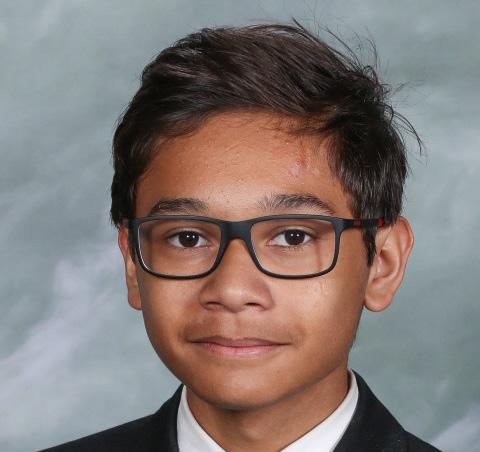
Jerome Wachter (802)
‘The different activities that are organised with students from all ages and cultural backgrounds means that the Boarding House is really inclusive.’
Hanze (Jason) Xiao (12C), Cygnet House Captain
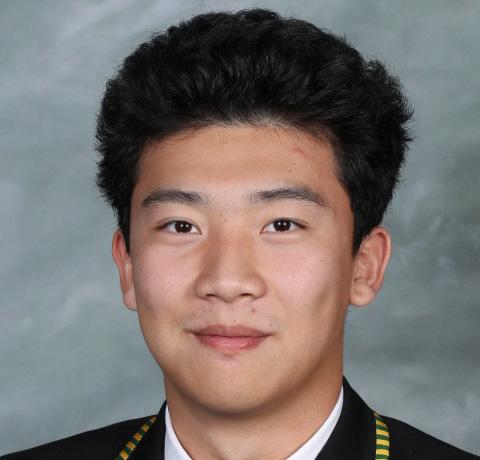
‘There are so many layers of community and involvement within the Boarding House. Students are not just restricted to hanging out with those in their same year group. Parents don’t just drop their children at the door and leave — they stay and chat. The staff are present beyond their rostered hours. You see the young kids of staff running around the Dining Hall and understand that it is more than a job. Wesley Boarding is all-inclusive.’
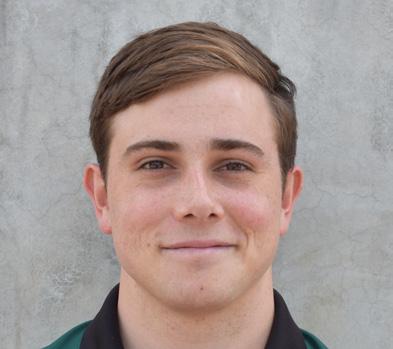
Thomas Goodheart (09-15), Resident on Duty

‘There are so many things that we can do that are right on our doorstep. The courts, ovals, pool and gym are all available for us to use. We never get bored.’
PICTURED Peter Trend.
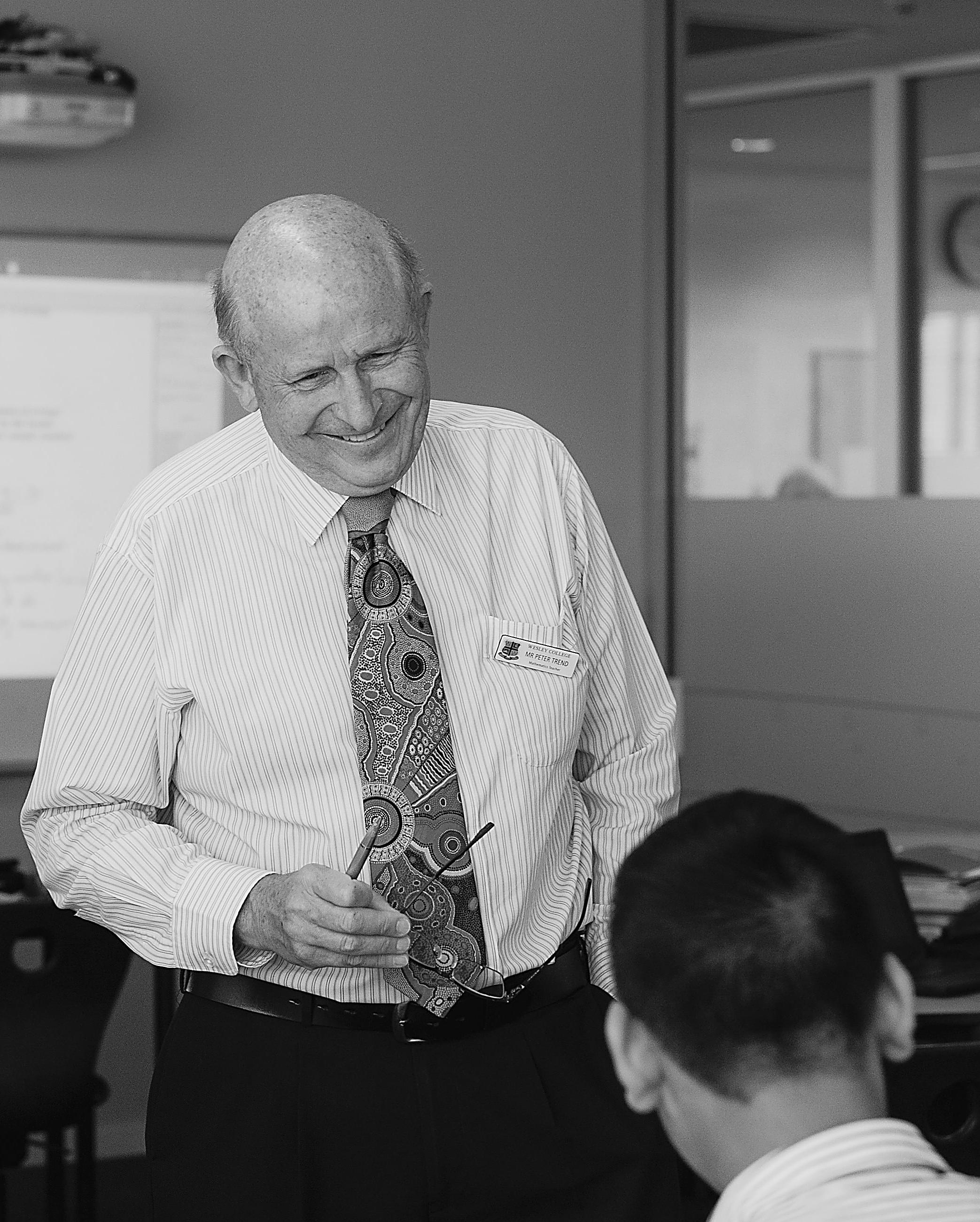
Setting the trend
Three life lessons from Peter Trend
In the words of the retiring Peter Trend, the impact of a teacher is often hard to measure:
‘As teachers, the biggest influence you have you may never know about. People take various things from your classes that, at the time, you may not have thought much about. It’s that influence that you can’t count or measure, and of which you are often unaware, that is what you’re most proud of as a teacher.’
With a remarkable 46-year tenure of teaching Mathematics at Wesley College, the scope of Peter’s impact is not only widespread, but also immeasurable. He has been an inspiring educator for our students, a much-loved mentor and confidant for our staff, and most importantly, an invaluable member of our community. Both inside and outside the classroom, we are incredibly fortunate to have had Peter involved with the College for so long.
Leaving the Wesley community with one final gift, Peter shared with us his top three life lessons.
1. Whether on a personal or a professional level, relationships are important.
They are what define your success in life. If you are leading a happy and successful life, there’s every chance that your relationships are strong. 2. Nothing is ever an absolute. As a teacher, you may think a student is not doing the right thing, but there is often a story behind that.
Everything is contextual and most things are relative. That’s true of life. You must get the full picture, and once you do, you will often realise that there is not one true answer to the problem at hand. 3. It’s important to not feel inclined to accept every change that comes your way. As I have become older, I have become a little bit more conservative. These days, there is so much change that there’s an inevitability about it. I argue that many changes need to be carefully examined in terms of philosophy. You need to go back and and ask ‘is this doing what we thought it would be doing?’ There’s no point in changing things for the sake of change. You need a strong philosophical base and an appraisal process. The practice should be an extension of the philosophy.
Thank you for your service, Peter, and we wish you all the best as you get to travel outside of school holidays, spend more time with your eight grandchildren and put your new set of golf clubs to good use.
PICTURED Michael Dunjey (78–90).


Michael Dunjey Going above and beyond
Michael Dunjey (78–90) is the founding Director of Ascent Foundation, which partners with change-making organisations and local leaders to transform the lives of the poor and the vulnerable in developing countries worldwide. His approach to philanthropy has been influenced by his belief that everyone is called to do something good and his passion lies in supporting people to live this through example.
How do you reflect on your time at Wesley?
I had two different stages to my journey at Wesley College. I was at the College from Years 1–3 before my family moved and we spent most of my upbringing living in Pakistan, before returning for Years 9–12. My time at Wesley was awesome. I loved it and thrived as I was very driven and competitive, especially in sport. I had a great group of mates and I look back on it very fondly.
Was it difficult to assimilate upon your return to Perth?
It was a very challenging period for me. There’s a psychological term for it called ‘third culture kids’, people who are raised in a culture other than that of their parents or the culture of the country where they were born. As someone from a first-world country who grew up in a third-world country, I sort of lost my identity. I grew up in a Pakistani culture, so when I returned to my primary culture, I had to relearn a lot of things and fit back in. It was very interesting, the whole reintegration process. The first two weeks were tough. I was assigned to a social group who took me in until one day I got to lunch and was told the two weeks was up and I had to go somewhere else! It still sits in the top five worst experiences I’ve had, but thankfully 20 minutes later I met two boys who I would remain very close to for the rest of my Wesley experience.
Who had the greatest impact on your time at Wesley?
I had a teacher called Jim Bausor who taught Calculus and was my middle-distance running coach. Running was a big part of my Wesley experience, and from Year 8 I had maintained the goal to represent Wesley in the 3km at the Inter-School Athletics Carnival, which I achieved in Year 12. It’s funny what sticks with you, but on the bus ride to the Athletics Carnival, Jim came up to me and said ‘I believe in you, you’re going to do this’. My goal had been to simply get to the race, which had already been achieved, but Jim’s words gave me a real boost and from out of nowhere I came second, in a very competitive event. From there I took the belief that anything was possible. It was a life-changing, pivotal moment for me. If you can pass on and instill belief in someone, you can have such a powerful impact on their life.
Where does your passion for social justice come from?
I believe the biggest gift I’ve been given is empathy — everything I do is from a place of empathy. The upbringing I had played a significant role too, a lot of which I can still recall. When I turned four in Pakistan, the country was suffering through both famine and a long-standing military coup. There was a man who kept knocking on our door and asking for food, who we would try to help. One day I came out to play by myself and he was lying on the front lawn; he had died of starvation.
We did what we could but there were thousands of people in that situation. Not long after that my mum and I were at the markets and a young mother had similarly died of starvation. It was heartbreaking to see a crying baby in her dead mother’s arms. To an extent, I grew up in suffering, so when I became an adult, I knew I wanted to go back and help in whatever way I could.

